Aida Daly couldn’t have been happier to be horsing around Whidbey on her birthday.
Her grandmother, Gretchen Wood, of Coupeville, treated her to a Stride ’N Glide ride atop a horse named Tango.
“That’s a great choice,” said Daly’s mother, Amy Wood, “because she loves to dance.”
The little girl turned 8, just old enough to saddle up and trot in the woods accompanied by her mother, brother Wyeth and two guides.
“Congratulations, you’re just old enough,” said Sue Landusky, owner of the trail-riding business that set up on the corner of Highway 20 and Race Road last summer.
“Younger kids have to stay in the corral and be led around in circles. But it makes them happy and makes for great photos.”
Landusky said her love affair with horses started at age 3. “They put me on a pony and that was it. After that, I scooped a lot of poop to learn a lot about horses.”
Her service, which charges $25 for a half-hour trail ride, had a busy summer as did Coupeville-based Equestrian Crossings and Whidbey Equestrian Center.
“Word is getting out that I’m here,” Landusky said, who lives on six acres that include her makeshift small roadside corral.
Her seven tall Tennessee Walkers and black-and-white spotted donkey named Marvel the Magnificent are tough to miss when she sets up on weekends. Week day rides can also be scheduled.
“I’m so glad this is here,” Amy Wood said Thursday as she saddled up on Belle, a one-eyed horse who suffered a bad infection. Many of Landusky’s horses have been neglected and rejected by former owners.
“It’s tough to find a place to ride near Seattle that isn’t booked months in advance.”
This spring, Whidbey Equestrian Center, located south of WhidbeyHealth Medical Center, became a base for weekly Equestrian Crossings operations. The non-profit organization was launched in 2009 and is nationally certified to provide therapeutic horsemanship activities to children and adults.
It worked out a partnership with the center. In exchange for use of its covered arena once a week, it supplied volunteers to help with the center’s summer-long busy schedule of dressage competitions.
Every Wednesday, Judy Smith and her husband Doug drive in from Shoreline for 90 minutes of activity. The long weekly trip is worth it, said Doug Smith, who takes time off from his duties as a Shoreline District Court judge.
“She was chomping at the bit, so to speak, to be cleared medically to do this,” he said as Judy passed by atop a Norwegian Fjord horse named Bingsa.
“Judy rode in high school but that’s a long time ago.”
Judy Smith suffered a stroke about two-and-a-half years ago. Motor control on her left side was affected, leaving her with constant spasms in her legs and hands but it spared her speech, he said.
She wears a helmet and a belt around her waist so volunteers known as side walkers can stabilize her.
As her horse is slowly led around the arena, instructor Anne Luick calls out, “When you turn, don’t lean. Sit up straight.”
Riding a horse helps people suffering from nerve damage, explained Gail Correll, the group’s volunteer coordinator.
“Even for riders who are paralyzed the movement is stimulating the spine, and the brain recognizes the movement,” she said.
After being carefully dismounted from Bingsa, Smith stood at her walker, regained her balance and moved her left leg better than when she arrived.
“It does help,” she said afterward. “One time Anne told me to sit up straight and tuck my buns under and I had no concept because I didn’t have the nerve connection to do that.
“Three minutes later, she said, ‘You’re two inches taller. You did it.’”
After the ride comes carrot time. Smith holds a black bucket filled with small carrots and an apple. She nuzzles Bingsa’s long nose as the horse munches and munches and munches.
“Afterward I’m so relaxed I want to fall asleep,” she admitted. “But this is my favorite part.”



